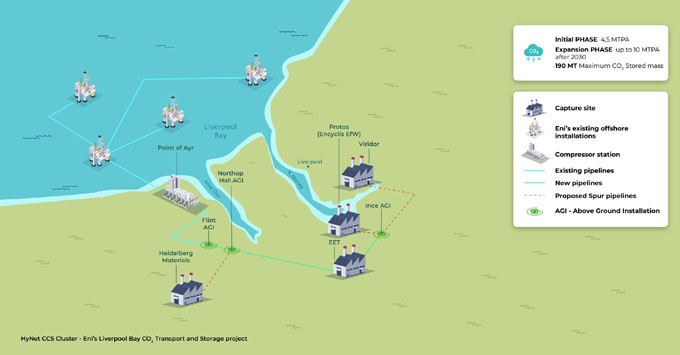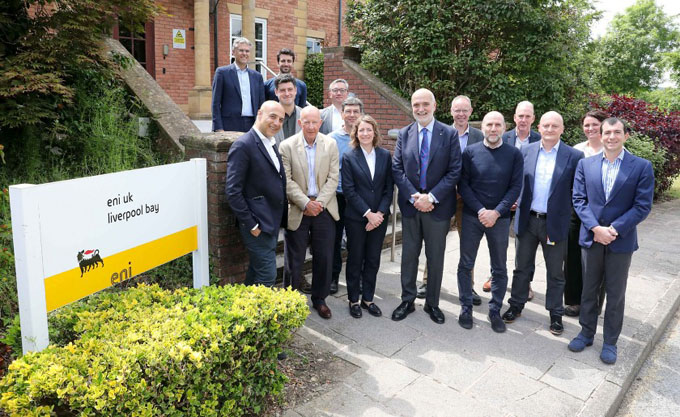

During the “Summit on the Future of Energy Security” in London, Eni and the UK government finalised the financial close of the Liverpool Bay CCS project, a central part of the HyNet North West cluster, one of the world’s most advanced CO₂ capture and storage projects. The agreement kicks off the project’s operational phase, unlocking key investments and generating positive impacts in terms of industrial competitiveness and employment. Once underway, Liverpool Bay CCS will transport CO₂ captured in North West England and North Wales to depleted reservoirs in Liverpool Bay, where it will be safely stored. The project involves the reuse of existing infrastructure and the construction of new pipelines, contributing to the decarbonization of industrial sectors with high CO₂ emissions. In addition to being the official operator for carbon dioxide transport and storage, Eni is also leading the consortium that manages the entire HyNet Cluster. With a storage capacity of up to 10 million tonnes per year by 2030, Liverpool Bay CCS strengthens the UK and Eni’s leadership in the energy transition.
CO₂ transportation and storage arrives in Liverpool Bay to serve HyNet Industrial Cluster
The HyNet North West project will capture carbon dioxide produced by land-based industrial plants and store it permanently and safely in depleted gas fields in the Irish Sea. Thanks to Carbon Capture and Storage of CO2 (CCS), one of the UK’s most energy-intensive manufacturing districts will become one of the world's first low-emission industrial clusters.
As one of the UK’s leading industrial decarbonisation projects, we are paving the way for a low-carbon future by reducing carbon dioxide emissions from industry and fostering economic growth in the North West of England and North Wales region. Eni, via its Liverpool Bay CCS project, will provide the backbone for the transportation and storage of CO2 as part of the HyNet cluster. In addition, Eni has launched the Bacton Thames Net Zero initiative in the southern North Sea of the United Kingdom, which will develop a new CCS project to contribute to the decarbonization of the Bacton area and the Thames estuary, while potentially also attracting CO2 from the European Union.

Visit of a delegation led by the Italian Ambassador to the United Kingdom, Inigo Lambertini, at several facilities in the HyNet Industrial Cluster
Project development and operation
Use of depleted gas fields
Carbon dioxide emitted by industrial plants in the North West of England and North Wales will be captured and permanently stored in depleted hydrocarbon fields in the Irish Sea. In this way, thanks to Carbon Capture and Storage (CCS) technology, the HyNet North West project will transform one of the most energy-intensive districts in the UK into one of the world's first low greenhouse gas emission manufacturing districts. Specifically, Eni UK's depleted offshore fields Hamilton, Hamilton North and Lennox will be used.
Eni leads the Transport and Storage of CO2
The Liverpool Bay CO2 Transport and Storage (T&S) infrastructure will be pivotal for the UK’s journey towards a Net Zero future, by unlocking the decarbonisation of the HyNet cluster in North West of England and North Wales. Thanks to the project, CO2 will be captured from industrial emitters in the region and injected into new and repurposed gas pipelines. The first emitters connecting to Eni's T&S infrastructure include industries involved in cement manufacturing, low-carbon hydrogen production, and energy-from-waste. The remaining T&S capacity will be filled with additional emitters to be selected by the UK Authorities.
KeyFacts Energy: Eni UK country profile l KeyFacts Energy news: Carbon Capture and Storage
 KEYFACT Energy
KEYFACT Energy